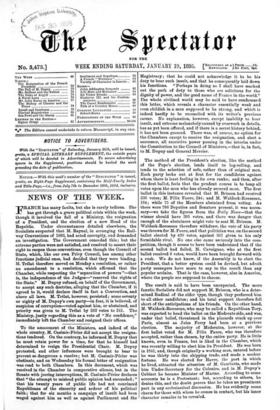The method of the President's election, like the method of
the Pope's election, lends itself to log-rolling, and tends to the selection of safe, rather than of original men. Each party looks out at first for the candidates against whom there is least feeling in its own ranks; and then, after the first ballot, feels that the prudent course is to heap all votes upon the man who has already secured most. The first ballot in this instance revealed that M. Brisson had received 338 votes; H. Felix Faure, 244; and H. Waldeck-Rousseau, 184; while 75 of the Members abstained from voting. As there were 788 Deputies and Senators present, it was neces- sary—we take the figures from the Dilly News—that the winner should have 395 votes, and there was danger that enough of the abstainers might vote to seat M. Brisson. M. Waldeck-Rousseau therefore withdrew, the vote of his party was thrown for M. Faure, and that politician was, on the second ballot elected by 430 votes, against 361 given to his only formidable rival. No one else came seriously into the com- petition, though it seems to have been understood that if the second ballot had failed, M. Cavaignac, who at the first ballot received 6 votes, would have been brought forward with a rush. We do not know, if the Assembly is to elect the President, that a better system could be devised, but adroit party managers have more to say to the result than any popular acclaim. That is the case, however, also in America, where the people are supposed to choose.


































